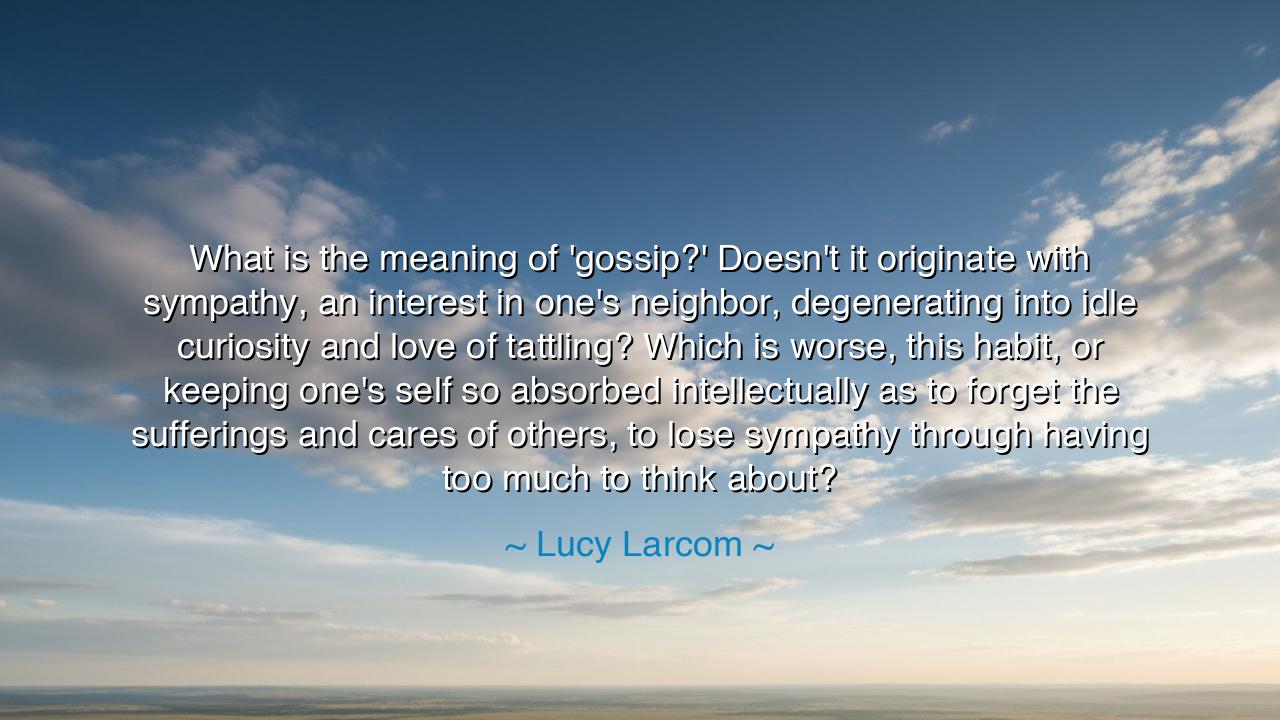
What is the meaning of 'gossip?' Doesn't it originate with
What is the meaning of 'gossip?' Doesn't it originate with sympathy, an interest in one's neighbor, degenerating into idle curiosity and love of tattling? Which is worse, this habit, or keeping one's self so absorbed intellectually as to forget the sufferings and cares of others, to lose sympathy through having too much to think about?






Hear the thoughtful voice of Lucy Larcom, poet and teacher of the nineteenth century, who asked with piercing honesty: “What is the meaning of ‘gossip?’ Doesn’t it originate with sympathy, an interest in one’s neighbor, degenerating into idle curiosity and love of tattling? Which is worse, this habit, or keeping one’s self so absorbed intellectually as to forget the sufferings and cares of others, to lose sympathy through having too much to think about?” In these words she reveals a paradox, for what begins in compassion may curdle into harm, and what begins in wisdom may harden into indifference. She bids us seek balance, lest either error pull us away from the true heart of humanity.
The meaning of her question is layered and profound. She traces the root of gossip not to malice at first, but to sympathy—to that natural human impulse to care about one’s neighbor, to wonder at their joys and sorrows. Yet she observes how quickly this seed of compassion can rot into idle chatter, curiosity without compassion, and finally, a love of tattling that feeds on the misfortune of others. And then, with equal gravity, she warns of the opposite danger: of burying oneself so deeply in thought, in books, in the pursuits of the intellect, that one becomes blind to the griefs and burdens of those around them. Thus, she asks, which is worse? The loss of sympathy through idle talk, or the loss of sympathy through self-absorption?
The ancients, too, spoke of this dilemma. In the marketplaces of Athens, Socrates warned against the spread of tales not tested by truth, urging the “triple filter” of truth, goodness, and necessity before words are spoken. Yet at the same time, philosophers who cloistered themselves in lofty thought often grew so removed from the common life that their wisdom bore no fruit for their fellow man. Larcom’s insight is timeless: to speak carelessly of others is folly, but to think only of oneself and forget the neighbor’s pain is folly also.
History offers us a vivid example in the days of the French Revolution. In the salons of Paris, gossip flowed like wine, carrying whispers that fueled suspicion and vengeance. What began as an exchange of sympathies turned into a river of idle curiosity and tattling, feeding the flames of fear until neighbors betrayed neighbors. Yet in contrast, some men of learning, shut away in study, ignored the cries of hunger and suffering in the streets, too absorbed intellectually to notice the needs of the people. Both extremes—chattering without compassion, and thinking without mercy—helped drive the nation into chaos.
The lesson Larcom offers is that true humanity lies in balance. One must not allow sympathy to degenerate into gossip, nor allow intellect to starve the heart of compassion. To care about others is noble, but it must be paired with respect, with discretion, with a refusal to delight in scandal. To think deeply is noble, but it must be joined with kindness, with attention to the sufferings of those near us, lest thought become a fortress of isolation. The union of mind and heart, of sympathy and wisdom, is the path of true human flourishing.
Practical action follows: before you speak of another, ask yourself—Am I speaking from genuine concern, or from idle curiosity? If from concern, speak gently, with the purpose of healing or helping. If from curiosity or malice, remain silent. And when you study, labor, or think deeply, lift your eyes from time to time to see those around you. Ask: Who is suffering? Who is burdened? Who needs my ear, my hand, or my heart? In this way, neither gossip nor cold detachment will rule you, but the balance of living sympathy.
Thus let the words of Lucy Larcom endure as a gentle but firm warning: that sympathy is a sacred gift, yet fragile, easily corrupted or lost. Guard it well. Do not squander it in gossip, nor bury it under endless thought. Nurture it in balance, so that your words may heal and your mind may serve, and so that you may walk in harmony with both the wisdom of the intellect and the compassion of the heart.






AAdministratorAdministrator
Welcome, honored guests. Please leave a comment, we will respond soon